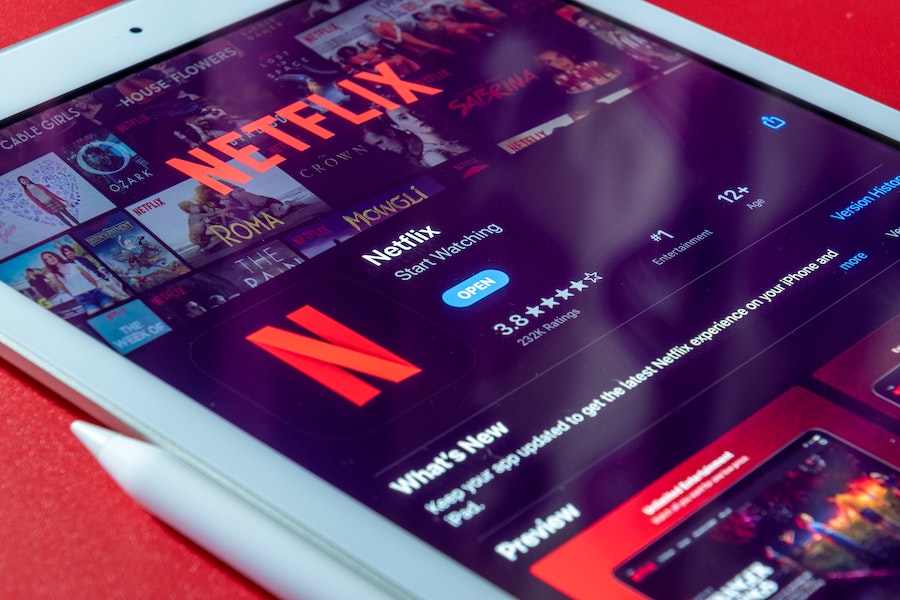Artificial intelligence has revolutionized many industries, and the entertainment industry is no exception. In recent years, many providers decided to bet on AI-powered streaming service to elevate their game. Their popularity increased even more thanks to personalized recommendations, efficient content creation and distribution, as well as enhanced data analysis that allows these online broadcasters to offer even more to their viewers.
Services like Netflix, Hulu, Spotify, YouTube, TikTok, and many more use AI algorithms for multiple purposes. They study people’s viewing history, preferences, and behaviors to provide tailor-made, enjoyable experiences. Moreover, the technology helps them to promote their movies and shows, keep the users on their platform instead of moving to another one, and increase revenue. Additional providers of AI solutions (for example, cloud services) offer an infrastructure for seamless, high-quality streaming.
This article explores many sides of AI in streaming services. We will take a closer look at specific algorithms, benefits, and challenges. Our goal is to provide real-life examples of established platforms that utilize artificial intelligence to their advantage. Finally, we will discuss how AI could influence and shape the future of the streaming industry and how it changes the way we consume media.
Streaming services with artificial intelligence – the background
Before we dive deeper into today’s state of artificial intelligence streaming, we should discuss how it all began and why it even became something interesting for the entertainment business. The digital transformation started in the 1950s and 1960s when the first pieces of art were generated by computers. AI’s evolution throughout the years influenced all the involved industries, from movies to sports. Now, it’s utilized regularly for numerous activities, and it transforms businesses within the niche.

Source: Unsplash
The technological advancement of artificial intelligence algorithms enabled the development of increasingly sophisticated systems dedicated to the entertainment sector, including streaming services. It became a crucial component of such platforms, providing many useful features to companies and their customers.
Machine learning, natural language processing, computer vision, and other divisions of AI are now boosting the way streaming services operate. Like any other modern company, they have to rely on vast amounts of data to be analyzed. Additionally, they have to respond to their users in real time.

Here are the exact methodologies and technologies used to execute AI-based strategies in the streaming realm.
How AI-powered streaming services work
A streaming service is a platform that allows users to consume various types of content like movies, shows, music, and other forms of media. The main factor that makes such a system stand out is that it requires an internet connection, but the user doesn’t have to download anything. They get immediate, real-time access to the chosen piece of content and can immediately watch or listen.
Streaming apps and websites are replacing traditional approaches to media consumption like cable TV, renting DVDs, buying CDs, etc. Their popularity is caused by many factors, including on-demand access, smaller amounts of advertisements, lower costs, and unique content. At the moment, most of the recognized platforms use artificial intelligence to support their efforts in providing the best experience to their audiences.

Source: Unsplash
AI algorithms used by streaming services
Content streaming platforms frequently use machine learning as their primary AI algorithm for data analysis and recommendations. That’s because ML solutions are trained to learn from large datasets, identify patterns and make predictions about many variables like users’ future preferences, required business models, and ongoing content suggestions. Netflix uses several machine learning algorithms that evaluate reviews, search terms, similarities, and many more variables. Then, they deliver personalized suggestions to their users.
Another popular approach is to use natural language processing. Disney+ is a prominent example. They use NLP algorithms to provide even better recommendations. To do that, the algorithm tries to not only analyze the phrases searched for by the users but also understand the emotional intent behind them.
Many providers use a combination of several algorithms and human work to create interesting, but familiar suggestions. That’s usually caused by business strategies centered around the social aspect of media streaming. HBO Max and Spotify operate on this approach. That’s why they have certain “hubs” of content prepared by the brand’s employees. This way, it becomes easier for each user to browse through thousands of options and find the ones that really match their preferences. However, these companies also use machine learning for streaming purposes – the algorithms support people’s efforts.
Computer vision can also come in handy for streaming services. An India-based streaming platform Voot proves that by utilizing it to execute their advertising strategy and content production.

All the mentioned-above instances showcase how AI can improve customers’ experience and help brands elevate their operations. The most popular use case is machine learning in video streaming because it provides all the tools for a better media consumption process. However, other algorithms also prove they can offer value for streaming companies. Now it’s time to discuss in detail why AI became such a blast within this niche.
Advantages of AI in streaming services
We’ve mentioned some of the benefits AI brings to the table of the streaming industry. However, this subject requires additional elaboration. Understanding how artificial intelligence can improve streaming services for users and stakeholders is the first step towards utilizing it even better in the future. Here’s our take on the main advantages to consider:
Improved user experience and personalization
Platforms that don’t offer user-friendly, easy-to-navigate UX are often dropped by customers focused on personalization and fast access to information they require. Reports dedicated to individually designed experiences prove that more than half of users expect brands to treat them as individuals.
69% of consumers want to get recommendations based on data shared with an organization. They believe that if some information has to be disclosed, it can at least provide some advantage to the user. 45% of respondents claim that if the level of personalization is too low, they will pick another brand. These statistics apply to E-commerce, online businesses, and entertainment, too.
That being said, streaming services need to respond to their audience’s demand and make the content consumption fit each one of their users as a glove. To achieve that, they have to rely on enormous amounts of data. AI becomes their ally in its analysis and processing to present results based on traits like genre preferences, search history, binging habits, and more.

Source: Unsplash
This way, the customers receive content suggestions that match their needs, taste, and even emotional state. Aside from recommendations, their overall experience also becomes more tailor-made with personalized ads (if the platform uses them in their business strategy), additional features, community-related activities, and better customer support.
More efficient content creation and distribution
Artificial intelligence algorithms can increase the accuracy of all the operations behind the scenes. Content preparation and promotion among vast audiences can be difficult because we live not only in an era of information explosion but also a content explosion. Industry specialists talked about the number of choices and platforms people use daily a few years ago already.
In 2022, for the first time in history, people watched more streaming TV than traditional channels. At the same time, content – especially when it comes to long forms like movies.

Source: Unsplash
To make content that will stand out among thousands of proposals, the creators need to know exactly what people desire. AI comes in handy once again. Data analysis of trends is the best way to predict what users want to watch or listen to.
Moreover, since we live in a rapidly changing world where the popularity of certain things can blow up and drop overnight, AI can also automate the distribution process across the correct channels. Reaching the target market quickly and precisely is crucial for success within the buzzy entertainment sector.
Better decision-making for providers
Streaming platforms are run by companies that want to make a profit. They have to manage employees, plan operations, and analyze the effectiveness of their business. To achieve entrepreneurial goals, they can use AI to support decision-making processes.
Making informed choices is an essential part of every brand’s daily work. From preparing target personas that will orient marketing efforts to new features that have to develop for more customer satisfaction – data analysis boosted by algorithms gives brands a perspective on what they should do next.

Source: Unsplash
Artificial intelligence proved over the years that it improves almost any department’s success rate and contributes to revenue growth. It can be incorporated into any enterprise with various tools. Most streaming platforms have algorithms that work for them to provide all the mentioned-above benefits.
However, they can also be introduced internally as apps and systems that positively influence productivity, automate tasks, and help managers with their work. This way, AI becomes an integral part of such business inside and out.
Additional benefits
The matters discussed in this article showcase how AI can be used for many purposes. Here are more benefits we thought were worth mentioning:
- Its role in the content’s growing accessibility is undeniable. Artificial intelligence can create captions, subtitles, and audio descriptions to help everyone enjoy media streaming.
- Video indexing is one of the discussed AI features useful for the industry. It can be utilized to raise the visibility of videos and their monetization possibilities.
- AI can also control server resources to ensure the highest possible quality of streaming in times of high traffic (for example, when hit shows premiere).
- Artificial intelligence enables streaming platforms to connect with other systems like voice assistants and smart TVs. This way entire experience becomes more convenient because the user can just ask Siri or Alexa to play their favorite music or series.
- Thanks to AI-based data analytics it’s easier to display consumer-specific ads and create new business models for profit growth.
- It’s a must for search engine optimization (SEO), which can be time-consuming and require a lot of effort. With AI, it’s automated and more accurate.
- Applying augmented and virtual reality to streaming services and letting customers immerse themselves in the world of the media they consume will be much easier and more entertaining with AI.
- AI is an excellent tool for detecting copyright infringement, as well as finding harmful content. It can be used to fix various security issues and fraud.
What the future holds for AI-powered streaming services?
Artificial intelligence streaming has its challenges, too. Algorithms can be biased. Their interoperability and compatibility are not always easy to achieve. The proper safety measures should be introduced to ensure personal data protection. These will be one of the main issues to take care of in the future. What else should we be aware of when planning the next steps for AI-based streaming platforms?

Source: Unsplash
It is expected that AI will bring even more advanced and personalized experiences for users. Data analysis will focus on every possible variable. The algorithms will know how long people consume content, what times of day they prefer to do it, and when they become bored with specific types of media. Result? Recommendations will be even more specific thanks to the combination of individual indicators and event or time-based trends.
The abilities AI offers are countless. The level of content customization will grow even more thanks to it. Algorithms will generate interactive stories the user will control with their own choices. They can also prepare additional content based on the user’s individual preferences.
For example, after watching a show, viewers might get a soundtrack playlist that corresponds with their music taste. Artificial intelligence will also play a large role in improving the visual and audio side of media. It will support animators and CGI experts in building even more vivid and exciting environments to enjoy.

Source: Unsplash
Compliance is another subject that AI can take care of. Age restrictions, location limitations, legalities, and other factors have to be considered when distributing content. Algorithms will automatically adjust the publishing strategy according to certain law-regulated rules.

Many of the trends that are predicted to emerge by industry specialists are already worked on and tested by numerous providers. Some of these features are just more advanced versions of what is already utilized on a daily basis. One thing can be said without a doubt – AI-powered streaming services are here to stay, and they will grow significantly in the upcoming years.
Final thoughts
Artificial intelligence with algorithms like machine learning, NLP, computer vision, and more revolutionized the way we interact with media content. Their job is to provide the most interesting, fun experience users want to continue for as long as possible. Of course, the goal behind it is profit for content creators and distributors.
However, thanks to AI, many problems that occurred in the initial era of streaming services are now fixed. The platforms have to be customer-centric and focused on delivering hyper-personalized experiences to keep their viewers with them. AI became their primary tool to achieve that. In the upcoming years, its importance will only grow. It will be responsible for making the whole streaming industry even better for consumers, stakeholders, and companies alike.
We’re quite excited to observe what will happen next. As the latest hype around ChatGPT showed, people are willing to collaborate with AI when it has the potential to make their personal and professional lives easier. We want computers to help us to free our time to do things we love. AI-powered streaming services correspond with this tendency because they focus on delivering content that matches our needs, moods, and preferences.
Incorporate AI at your company
Do you need AI-related services that will level up your business? Reach out to us, and let’s discuss your ideas. We can be your AI introduction partner throughout the project. This will revolutionize your organization for sure.
The right place to start is artificial intelligence consulting. With the right plan, you can invest the required resources and achieve success without going around in circles. Let’s partner up and do it, shall we?



